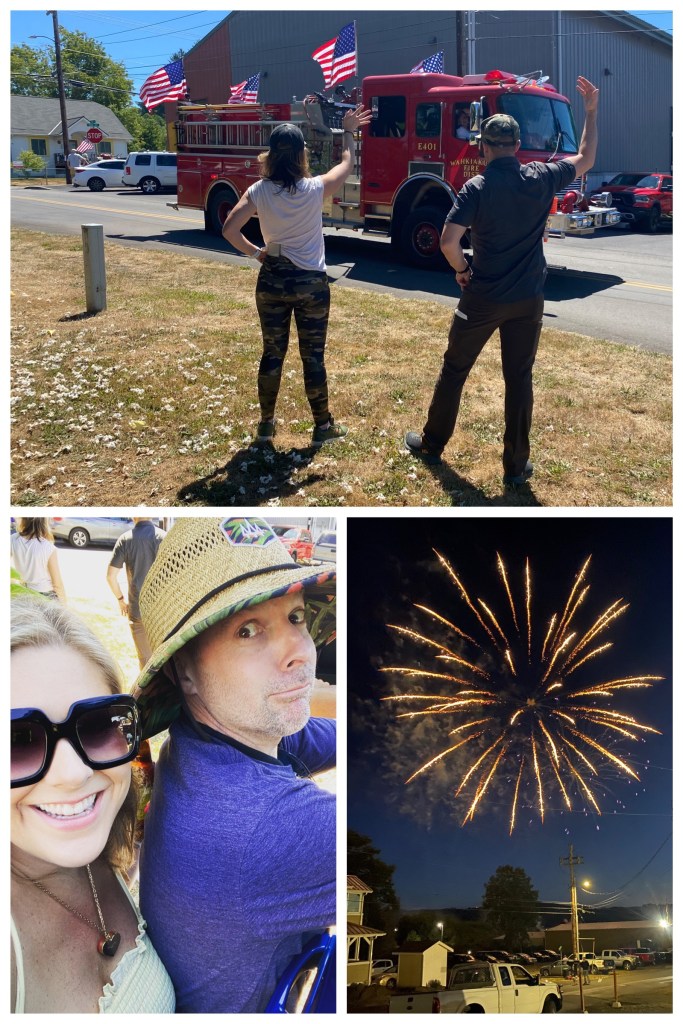In July I wrote about the cross-country road trip I had just taken with my husband V from Virginia to Washington state. The purpose of our trip was to visit my dad and stepmom, so for the first time I went to the west coast without making it down to California.
My stepmom was diagnosed with a serious illness early last summer. Since then, I’d visited her and my dad five other times. But V had not seen either of them since they came to visit us in Mexico in October 2021, several months before my stepmom’s diagnosis. As she entered hospice in June of this year, it became more important V and I visit together. My brother C and my stepbrother J and his family came too; my stepbrother B had visited the week before. And she was very happy to have us all under one roof. For me, it was reason #528 a domestic tour is a great place to be right now vs. serving overseas.

The beauty and happiness of the photos in this post belie the more difficult aspects of the visit. Yes, it was wonderful to see and help out my family. I got to spend prolonged quality time with my dad and my brother, who came up from California. We spent some of our days doing fun things, like hiking to the pine ridge, working on our cars, attending their town’s annual patriotic festival complete with parade and fireworks, and swimming in the river behind my dad’s house.

My brother C, stepbrother J, and J’s wife H all came from California for the town’s annual festivities
And also, it isn’t easy to watch a loved one get sick with a terminal illness and enter the end-of-life stage. It isn’t easy to see your parents get older and try to sort through caregiving and estate planning decisions. It isn’t typically the subject of our curated social media posts in which we disproportionately focus on the positive.
And yet all the hard parts are equally a part of the landscape, if not more so. We hold the two discordant realities of being glad to see each other and being sorry about the circumstances side by side. Some things are just kind of awful and there’s no sense in pretending otherwise.
Even though this is something we knew was coming, it’s still confronting to see the way an illness can change someone’s life day-to-day. Before she got sick, my stepmom used to cook every meal; I never saw her enter the kitchen during the nearly three weeks I was there. She’s always preferred to rise on the later side, but most days I was there she didn’t get up until the afternoon, and sometimes not even until close to dinnertime. This is the exhaustion that happens when someone can no longer eat solid food.
Subsisting on frozen yogurt, cottage cheese, ginger ale, applesauce, and strained chicken broth probably also doesn’t make a former gourmet chef look forward to getting out of bed and seeing what’s to eat. I brought my Ninja blender and made her high-protein peach milkshakes with collagen powder, ice cream, and whole milk that came in at over 600 calories each, and she drank them happily through a straw while sitting in her chair.

Probably the greatest practical struggle in such sad situations is trying to figure out the best way to help. There is nothing I can do to fix any of this. But around my telework schedule (three hours ahead on east coast time), I busied myself trying to make things a little easier for them – going through papers with my dad, cleaning the house a room at a time, walking the dog, doing the laundry, and generally not waiting to be told what needed doing.
It didn’t take long to see the absolute chasm between what Medicare-funded hospice provides in this country (a few hours of nursing per week) and the needs of most seriously ill people, whose preference to die in their own home can be in conflict with their need for around-the-clock medical and housekeeping support. A 2019 New England Journal of Medicine study found that 60 percent of American patients still die in facilities, despite a 2017 Kaiser Family Foundation study showing 70 percent of Americans wish – eventually – to die at home.

My dad and stepmom live in a rural area. Between them they have four adult children, but the closest lives an eight-hour drive away. Despite having excellent health insurance and long-term care insurance (LTC), the struggle through red tape, bureaucracy, and anticipatory grief to access said care is real. Which agency does nursing and which can help with chores? My dad and I pored over brochures and policies and spent hours on the phone. My dad struggled through a disappointing, mind-numbing checklist of to-dos to cancel a trip they’d planned to Ireland this September.
In the movies, we see people dying at home surrounded by equipment and nurses. But in real life, in the end, it often just comes down to family members and the patient’s spouse. I never knew this, and it was sobering. This can feel scary or unmanageable when the medication gets complicated or if the patient is in pain or behaving in an unfamiliar way. My dad is far healthier and more mobile than the average person his age, but he’s been doing it all alone for the past year, and he’s understandably tired and sad.
I can’t speak for my siblings, but I bristled a little to hear our hospice coordinator describe our family’s situation as “unusual” in terms of all of us living so far away, thus lessening our ability to “help.” My first reaction was defensive. Hadn’t we been helping? She was right a problem exists, but I see the problem as more systemic.

A 2021 study by the Journal of Pain and Symptom Management found “approximately 61 percent of family caregivers in the United States are also working outside the home.” Is it really so ‘unusual,’ I wondered aloud, that adult children cannot drop all their own obligations to move into their parents’ home for weeks, months, or even years to become a full-time unskilled nurse? And even if we could do this, wouldn’t we want to be present to spend our time meaningfully with our loved one, and not doing chores or medical things?
I know hospice care worker intentions were not to criticize anyone, but it was a frustrating reality check to be compared to some faceless “other” families who supposedly were handling things better than us. My dad and stepmom had a right to retire to a state where they knew no one. I had a right to let my work take me to the east coast – the closest, by the way, I’ve lived to my family since 2015 with the exception of my Mexico posting. My brother and stepbrothers had the right to start young families and work jobs with limited to no paid leave that keeps them tied to home. All of these choices have consequences, and yet, how is it down to just us? None of us can afford to take a leave of absence to collect the small daily amount of Medicare reimbursement while surrendering our own healthcare benefits tied to our employment.
The problem here isn’t with us and our willingness to help, but actually some outdated and unrealistic assumptions about familial obligations vs. what society should do. The fact is society doesn’t value care work monetarily, and most family members are not qualified to be nurses. I unapologetically did what I always do: say it like I see it. To be fair, our nurse didn’t disagree with me, at least not out loud; she’s working within the same system we all are, and working very hard too.
And isn’t it ironic that this same system will put you in a facility and give you all the care you need, at a much higher cost, but if you want to stay at home – assuming you don’t live alone to begin with – it’s pretty much on you and your family to sort out. And personally augment whatever Medicare and your LTC don’t cover above the daily limit of reimbursable care.
Why couldn’t the system that exists come alongside people better when they aren’t yet ready for a facility? Why either over- or under-medicalize everything? And what happens when the patient can’t get to the bathroom anymore, or gets panicky or combative in the middle of the night? What happens when the patient is no longer in a state of enough lucidity to make decisions on their own behalf? I guess it’s the people who just want to spend time with their loved one who need to figure that out, too, amongst running full-speed from task to task with no medical training, feeling as though they have a brain injury from anticipatory grief and all that’s gone on. It all becomes a blur.
Then the doorbell rings and it’s your neighbor, with a slow cooker full of Swedish meatballs and a Tupperware full of pasta salad, and it almost brings you to tears of gratitude. I’m here, I thought, wondering for the thousandth time since the pandemic how society’s expectations of ‘being present’ are going to keep shifting. In practical terms, you can be absent while in the same room. But for all intents and purposes, no matter how ‘close’ it feels to me to hop in the car and drive 3,000 miles in less than four days to be with my family, I’m not there every day. And sometimes I woke up in the morning to learn the night before had been bad, and even sleeping right down the hallway I had not known. My dad isn’t wrong that it has been down to him. It’s a strange place to be in, especially for a family that has been so capable and self-contained.
My stepmom sat quietly day after day, managing her own pain and mood admirably, watching her shows, talking on the phone with her friends, and somehow being less afraid than anyone else. We are trying to provide her wish of staying home, but I can’t say she’s getting what she wants. What she really wants is to live another 20+ years with my dad, playing video poker, taking trips in their trailer, watching the History channel, and seeing her granddaughters grow up. The cold reality of which we are reminded stings: we can’t truly protect anyone we love.

My stepmom’s hospice nurse shared with our family two books by renowned hospice nurse and grief expert Barbara Karnes, RN about caring for someone with terminal illness. One was called My Friend, I Care: The Grief Experience and the other was called Gone From My Sight: The Death Experience. I came to think of them as ‘the yellow book’ and ‘the blue book,’ respectively.
I appreciated both books, but perhaps the blue one slightly more so. For me, it set remarkably clear expectations about what a terminally ill patient experiences during their last months, weeks, days, hours, and minutes. It was also written in a very simple and compassionate way, so it was easy to understand. There were a lot of things in there I hadn’t known, and I highly recommend it to all hospice patients and their families.
The yellow book was overall very good, but made me angry in one section where it seemed to equate grief as selfishness. I read it as: I’m only sad because there’s a you-shaped hole in my life, and I need to move past that feeling of me having been the one to lose you. Obviously, I disagreed.

I could be paraphrasing unfairly, but that was how I took it anyway. I think it’s possible to grieve ‘selfishly’ by equating the loss of the person with the loss for you of that person without seeing the broader context. But it’s equally possible to feel sad and angry about the loss of someone you loved in the world because you know in your heart they belonged here. And to feel sad and angry about what the person who died or will die is losing for themselves. And all of this simultaneously, indefinitely, while not being wrong.
I’m sensitive to grief being portrayed as something to feel ashamed about, something to quickly move past because it’s unpleasant, or something invalid because someone is “doing it wrong.” There is nothing wrong with how you grieve a loved one, and it isn’t for anyone else to ‘explain’ to you how you should feel. Period.
I am grateful, though, for hospice programs and resources helping us think through and understand topics we often don’t talk enough about. Some attempt to talk about grief is better than just acting like it isn’t happening, or isn’t normal. As a family we were able to have very open and honest conversations on the books’ topics and that was helpful.

I am also grateful my work gives me the ability to work from a different place occasionally than DC, while still covering all my portfolio responsibilities.
Ms. Karnes’ book, Gone From My Sight, is supposed to help family members process the death experience. For me, the book and this visit reinforced that presence exists in the absence of sight – whether it’s a loved one who has left our realm, or loved ones who live far away and are present with us in spirit. In times when nothing can guard against suffering, your presence becomes the only thing that can comfort and the only meaningful thing you can truly offer.

1 comment for “Gone From My Sight”